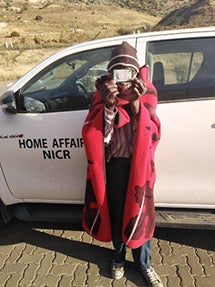
By putting people at the center, Lesotho’s Department of National ID and Civil Registry (NICR) in the Ministry of Home Affairs is laying a solid foundation for a simpler, more efficient government. Trusted and inclusive identification systems have been shown to reduce poverty and inequality, foster financial inclusion, facilitate safe and orderly migration, improve public sector efficiency, and more.
Since its launch in 2013, Lesotho’s national ID system has steadily expanded coverage and strengthened links to service delivery. The cornerstone of civil registration (CR) and identification in Lesotho is the National Identity Register (NIR), which is underpinned by a digital database and identity management system that uses biometric technology to confirm the uniqueness of identities.
In order to provide the greatest benefit to citizens, both the civil registration and identification systems must be accessible to all. With close linkages between the NID and the civil registration system, Lesotho has made great strides providing its population with a trusted, unique, and verifiable identity from birth to death. The national ID covers an estimated 85 percent of the eligible population (that is, a little over 1.2 million people of a total eligible population of 1.4 million), compared to the sub-Saharan Africa average of 71 percent. There are larger gaps to bridge for civil registration, with 44.5 percent of children under the age of 5 having had their birth registered in 2018 and a death registration rate of 38 percent in 2019.
To reach the approximately 200,000 people without a national ID, the NICR launched an initiative to make the national ID more accessible to those living in rural areas and among marginalized and vulnerable groups who may be socially excluded, lack the supporting documentation needed to obtain an ID, or be constrained in their mobility—Lesotho is a small mountainous country, with some regions accessible only by horseback or helicopter.
Partnering with the World Bank, Ministry of Finance, Ministry of Public Service, and Ministry of Social Development, the NICR invested in mobile registration technology that allows the Department to temporarily scale up capacity at its 10 district offices to meet demand and carry out registration drives outside their offices. These watertight suitcases contain all the equipment required to register a birth or issue a national ID anywhere in the country—including in someone’s home! Between 2018-2020, the Department expanded access to the ID among civil servants and civil pensioners. From June-October 2020, NICR staff traveled by horseback into rural areas with mobile registration kits, visiting the homebound and issuing 6187 new IDs.
The results of this initiative illustrate how investing in technology can help put citizens at the center of service delivery—increasing accessibility and improving user experience. Just as important, the expansion of national ID coverage is being used to improve the efficiency of public expenditure and increase public trust in the government’s stewardship of resources. The Ministry of Public Services is using the ID to verify the uniqueness and liveness of civil servants and civil pensioners. The Ministry of Finance is utilizing the ID system to verify the eligibility of Old Age Pensioners. These initiatives are already generating fiscal savings and helping promote trust and accountability in the management of public resources.
Further investments in technology paired with continuous efforts to simplify registration processes will increase and sustain improvements in the accessibility of civil registration (birth, death) and national ID. Improving identity verification services for public sector agencies (e.g. social assistance programs, drivers licensing, etc.) and the private sector (e.g. banks, mobile network operators, etc.) will generate further improvements in the efficiency of the public sector, while also improving access to financial services.
The efforts of the Department National ID and Civil Registry represent an impressive start on the Mountain Kingdom’s journey toward using a trusted and inclusive identification system to unlock shared growth and prosperity—all made possible by putting citizens at the center!





Join the Conversation